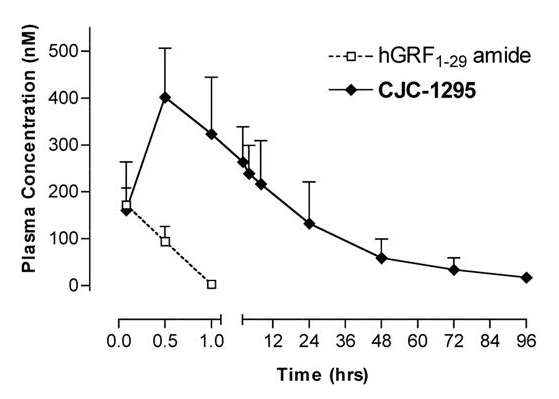CJC-1295 and Growth Hormone Release
As a derivative of GHRH, it's expected that CJC-1295 would stimulate GH release. Studies indicate that a single dose of CJC-1295 can increase GH levels in mice by 2-10 times. Peak GH levels are typically reached about 2 hours after administration, and the effects can last for approximately six days. What sets CJC-1295 apart from other GH secretagogues is its ability to maintain the normal physiological release of GH[1]. This means that the natural peaks and valleys of GH release throughout the day remain unaffected, making CJC-1295 a physiologic growth hormone-releasing factor.
Maintaining the natural GH release pattern while enhancing the hormone's concentration in the bloodstream is crucial for achieving heightened effects without increased side effects. Notably, CJC-1295 has been shown to preserve GH's physiological impact on hyperplasia, hypertrophy, bone density, blood sugar regulation, fat metabolism, protein synthesis, and myocardial (heart cell) function.
CJC-1295 and Growth
Research conducted on mice lacking normal GHRH physiology has revealed that CJC-1295 maintains the regular release of growth hormone (GH)[2]. This characteristic makes the peptide a potentially valuable therapy for addressing abnormal growth in various mammalian species, including humans. Preserving the normal pulsatile release of GH is crucial to ensure the appropriate secretion of downstream hormones, such as insulin-like growth factor-2 (IGF-1).
CJC-1295 and Infertility
Early 1990s research suggests that CJC-1295 and similar GH-releasing factor (GRF) analogues could have potential in promoting ovulation among infertile female patients. Scientists have recognized the role of insulin-like growth factor-1 (IGF-1) in ovulation and its likely connection to growth hormone (GH) release and cycling. Studies in animal models of superovulation support these theories, demonstrating significant increases in both GH and IGF-1 levels during ovulation. Moreover, administration of GH secretagogues, such as CJC-1295, has shown to induce appropriate ovulation[3]. There is also speculation about the potential application of CJC-1295 and similar analogues in male infertility to regulate sperm production, although this hypothesis has yet to be tested.


